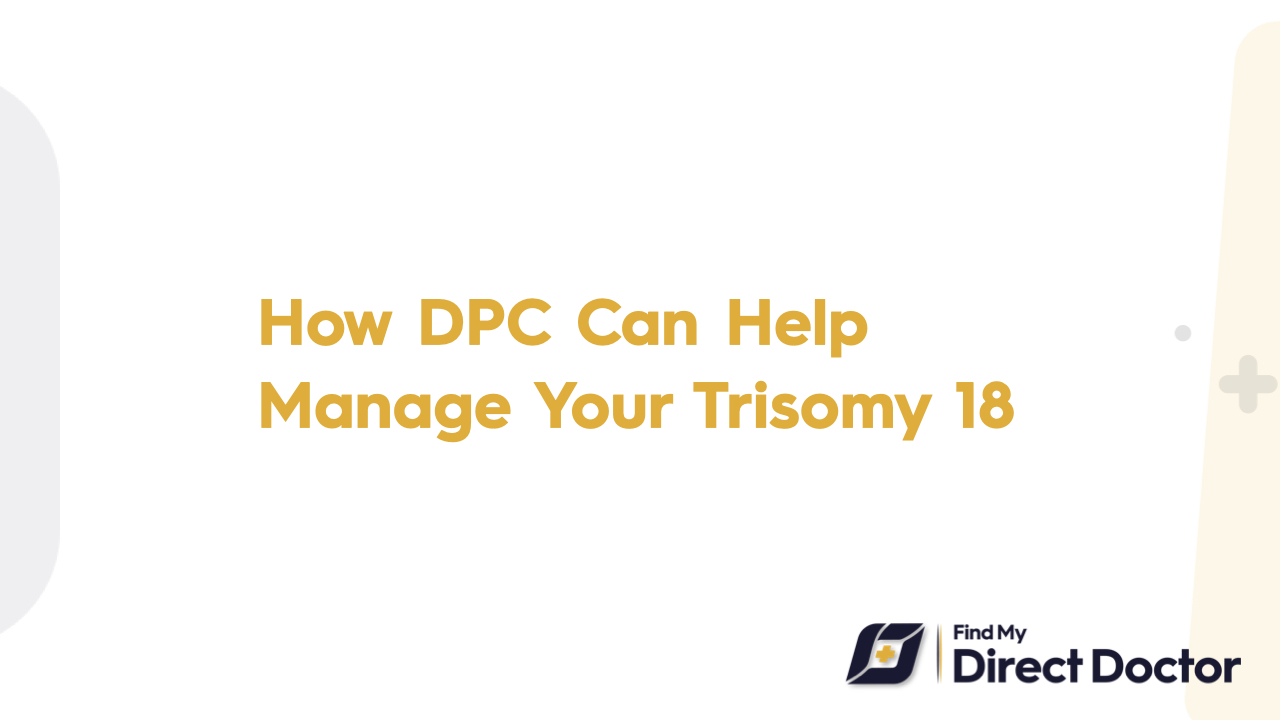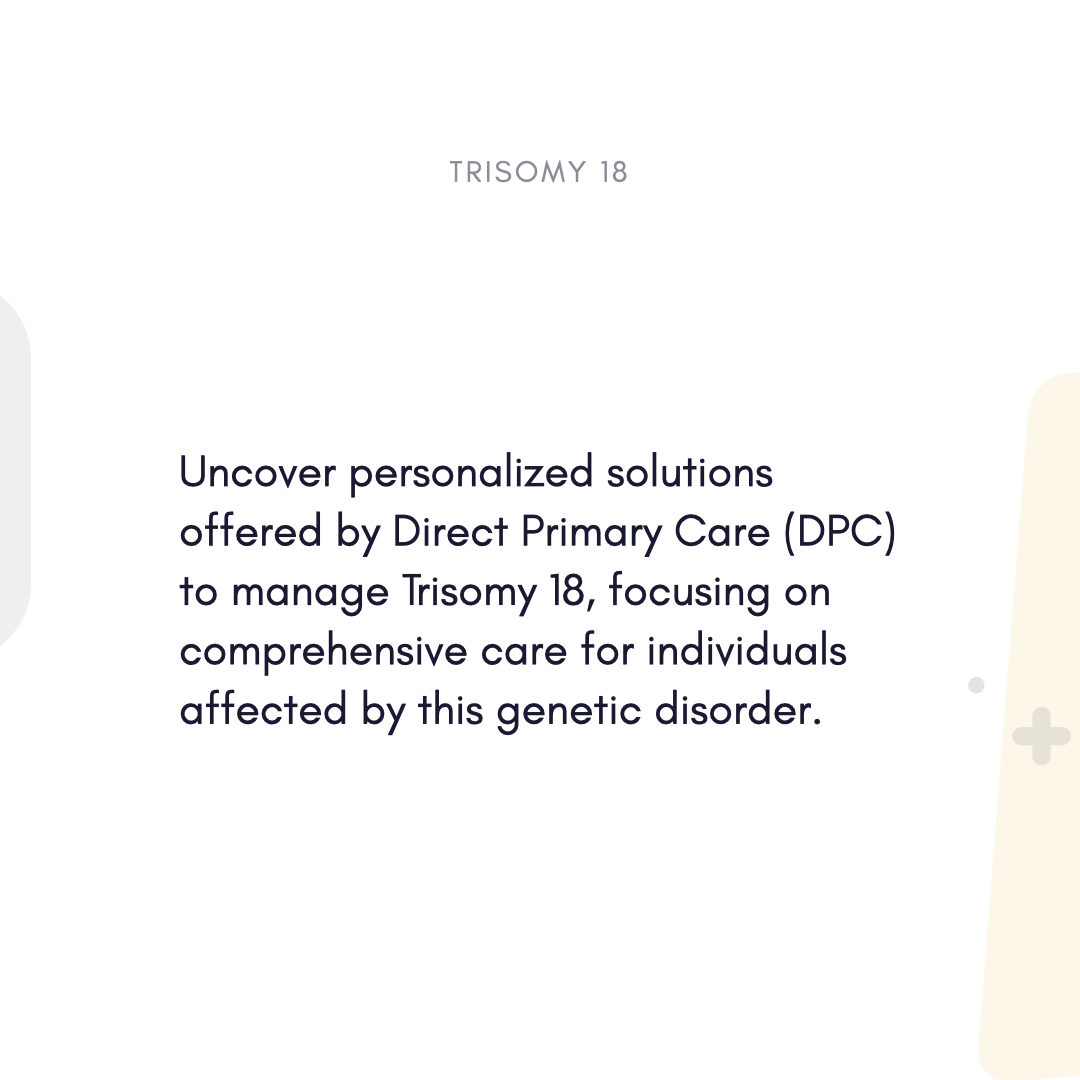Trisomy 18 (Edwards Syndrome) and Direct Primary Care (DPC): Nurturing Care for Fragile Beginnings
Should your diagnosis be Trisomy 18, you are negotiating a road lined with great love and heartache. Affecting one in five,000 newborns, this chromosomal abnormality requires specific, sensitive treatment. Direct Primary Care (DPC), however, gives families a haven combining instant medical access, cost transparency, and relentless support through every precious moment.

Recognizing Trisomy 18 and Its Complications
Trisomy 18 results from an extra eighteenth chromosome, producing:
- Severe developmental delays: Intellectual handicap, growth deficiency.
- Congenital anomalies: kidney malformations, 90% heart defects, clenched fists.
- Ten percent survive > one year; fifty percent survive > one week.
Challenges in care:
- Feeding problems, regular hospital visits for infections.
- Choice of palliative care.
- Financial and emotional weight on households.
DPC Changes How Trisomy 18 Care:
Under the membership arrangement known as Direct Primary Care (DPC), which usually runs 50 USD–150 USD, families pay a monthly fee for unrestricted access to their primary care physician. For Trisomy 18 families, this means no waiting for critical consults, no surprise bills, and treatment focused on comfort and dignity.
Here's why DPC distinguishes itself:
1. Medical Guidance Available 24/7
DPC doctors follow AAP recommendations including:
- Triage symptoms: Evaluating fever, seizures, or coughing.
- NG/G-tube management and reflux strategies support feeding.
- Comfort care: coordination of oxygen therapy, painkillers.
2. Reasonably priced, comprehensive coordination
- By working with home health nurses for almost continuous care, DPC clinics help to lower costs.
- Offering palliative drugs (such morphine) at cost.
- Negotiating cash rates with pediatric cardiology and neurology experts.
3. Support centered on families
Families using continuous DPC access can:
- Access sibling support materials and grief counseling.
- Under provider direction, negotiate moral choices (e.g., surgery against hospice).
- Get safe respite care to stop caregiver burnout.
DPC Benefits for Trisomy 18 Families
Customized Care Strategies
- DPC doctors spend hours each visit developing comfort-oriented plans such as: Control of dyspnea and pain.
- Celebrations of milestones: catching smiles, first grasps.
- Memory books and hand/foot casts define legacy building.
Financial Restraints
- No co-pays for telehealth or quick house calls.
- Specialists consult at 50–70% less than insured rates.
- Preventive symptom control helps to avoid ER overuse.
Perfect Transitions from Care
DPO guarantees:
- Coordination of hospitals: Notifying NICUs/palliative teams of records.
- Planning for end-of-life honors family preferences for home hospice.
- Bereavement support: Linking to communities experiencing infant loss.
Real-Life Situation Examples
- Case 1: Under DPC's direction on controlling their son's apnea at home, the Johnsons avoided three ER visits in a month.
- Case 2: With DPC-supported hospice care—including professional photos—Baby Grace's family made lifelong memories.
Ask questions about DPC and Trisomy 18.
- Q: Can DPC manage crises including cardiac arrest?
- A: While coordinating EMS, DPC doctors guide families through crises and guarantee comfort-oriented interventions.
- Q: For families who must visit hospitals often, is DPC reasonably priced?
- A: Sure. Flat-rate pricing reduces financial strain during medical crises by covering unlimited consults.
- Q: Should we be in genetic counseling for next pregnancies?
- A: DPC links families to experts in maternal-fetal medicine and geneticists.
Why DPC Offers Trisomy 18 Families a Win
Family-centered approach is stressed by the National Organization for Rare Diseases (NORD). DPC delivers this via:
- Giving access top priority: 24-hour consultations for breathing crises or feeding difficulties.
- Encouragement of families: teaching advocacy and symptom control.
- Honoring paths: Supporting the particular road each family takes, whether days or years.
Value Every Beat Using DPC
A Trisomy 18 path is measured in moments rather than milestones. Every consultation, every hug, every treasured memory—every DPC helps you find joy among grief and honors each heartbeat, eases burdens.






